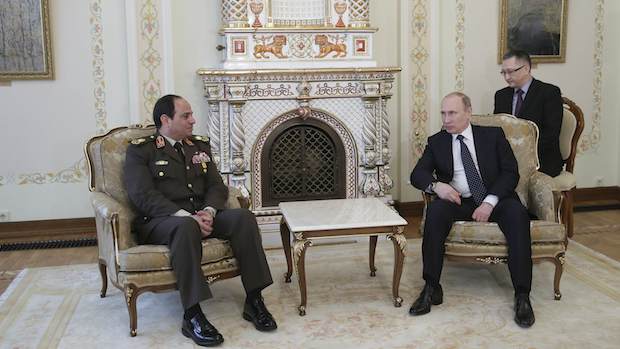The main event of last week in terms of the post-Arab Spring political alliances in the Middle East may well have been the visit of the Egyptian Defense Minister Abdel-Fattah El-Sisi to Russia, which included discussion of agreements to buy Russian arms, including aircraft and defense systems.
However, this visit has not been viewed in terms of the present day. Instead, as is customary in Arab culture, which is obsessed with the past, Sisi has been likened to Nasser, a comparison that disconnects the current political situation from today’s crises.
At political level, the visit had implications that must be considered away from the nostalgic comparisons between Nasser and Sisi and Putin and Khrushchev. In reality, Egypt is emerging from a tunnel of political Islam, after reinstating the concept of the nation-state in place of that of a particular community, political party or the military, and disrupting attempts to revive political Islam through the carrot of aid and the stick of marginalization.
In terms of Egypt specifically, the country suffers from a surplus of nationalism, which threatens to transform the political contestation that has followed the downfall of the Muslim Brotherhood into the manufacture of a loyal hero-savior figure. This will make it doubly difficult to ‘domesticate’ a new president into democratic practice once he has removed his military uniform.
Subsequently, America once again made a historic mistake, akin to the mistakes of the “war on terror,” of expressing concern about the fate of a group which, because of popular feelings that are growing day by day, is becoming a banned minority, and could later become another of the repressed, clandestine movements that fill our political history.
Reasserting the concept of the state in Egypt was not a decision taken by the army, a picture painted by those who still play the “coup and political injustice” tune, which has increased the isolation of the Brotherhood from the street and from reality. It was a decision supported by the people and members of the political elite, some of whom agreed and some disagreed with Sisi, but all of whom agreed on the impossibility of the return of the Brotherhood, or political Islam, to the seat of power.
It is also a decision supported regionally by the moderate states led by Saudi Arabia, which means the establishment of a new regional policy outside of American plans for the region. This does not mean there is a rift in the relations between these states and the United States, as this is not what any of the parties desire or can afford, insofar as it means breaking the hegemony of the world’s only superpower, while at the same time the Arab Spring continues to introduce instability and new alliances to the scene, and leads to emergence the return of new players and the return of old one, including the Russians, who do not want to antagonize the United States.
There are alliances in politics built on temporary expediency, and now there is a regional desire to pounce on the failed experiment of political Islam, not only in Egypt, but in all Arab Spring countries that remain unsettled and where the parties of political Islam want to repeat the experiment of monopolizing power. However, day after day this wish becomes less likely to be realized on the ground, whether in Libya or Yemen, not to mention the radical shift in the tactics of the Brotherhood in Tunisia that made it abandon its parent group, at least in interim political stances.
What is certain is that no country has the ability to overcome Washington’s weight, but reducing this weight in regards to regional issues is very important in order to pressure the White House to change its strategy in the region, a strategy built on attracting political Islam in its two faces, Sunni and Shi’ite. These forces are seen as an alternative to current political regimes, which seemed uncertain even with the signals sent by former Egyptian President Mohamed Mursi and his associates regarding Israel, or those the Iranians try to send about contributing to the war on Al-Qaeda and its affiliates.
Finally, if the transformations Sisi introduced by his surprise visit to Russia seemed profound in the direct messages they sent to all parties, there was a regional visit which went unnoticed despite the fact that it would have an even greater impact on the region and on Gulf states.
That trip was the visit paid by Turkish Prime Minister Recep Tayyip Erdoğan to Iran. This appeared to be a very convenient visit, not in terms of the rosy statements that were issued as a result of it, but the increasing prospects of a new and influential alliance that will explicitly enhance the previous harmony between Sunni and Shi’ite Islamists on a political level. This is a step closer to political suicide for Mr. Erdoğan, although it will doubtlessly not be his last step in this direction.
